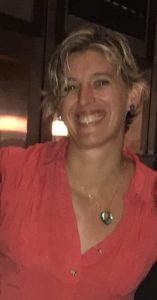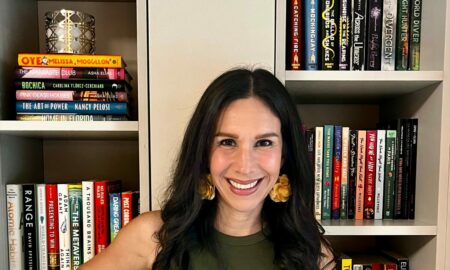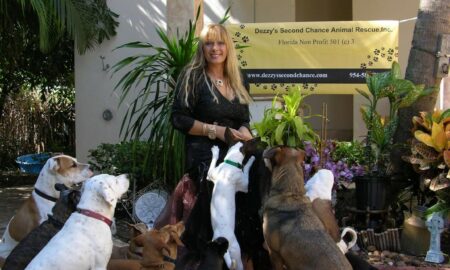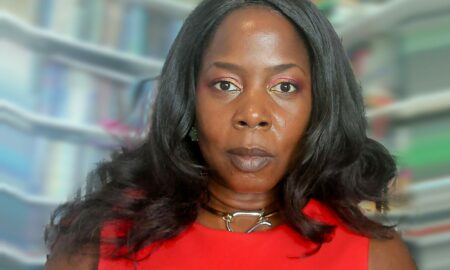
Today we’d like to introduce you to Kristen Guskovict.
Kristen, can you briefly walk us through your story – how you started and how you got to where you are today.
In 1996, I was a study abroad student in Geneva, Switzerland. At that time, the former Yugoslavia was breaking up. As a poor student, living in an expensive country, I lived in a youth hostel that year. Outside of students, and people staying in Geneva temporarily, the people who lived there were refugees. Throughout the year, I got to know them and their stories, and we became a community. I knew I wanted to work with people like them and help to make what happens next in their lives better than what they experienced as refugees.
On my way to class one day, about six months into my stay, my pocket was picked and my wallet was stolen. It happened to be a day when payment was due to the school, so I had that payment on me. After realizing it was gone, I went back to the youth hostel and called my parents from the pay phone in the hallway. We tried to figure out the best course of action, and I thought I might have to leave school early and lose the semester. But as my parents tried to figure out the school payment. My refugee neighbors started inviting me to eat with them, ‘We made too much’ they would say. Their help meant I didn’t have expenses for the next four weeks! And it made all the difference. I was able to stay and finish the semester. I think I’m still paying back that favor. With every refugee group, I have the opportunity to help.
Early in my career, I was a generalist (with an M.S. in Global Affairs and Humanitarian Assistance). But working with people who have experienced trauma is very difficult. It often leads to burnout, vicarious trauma, compassion fatigue and secondary trauma. These all look a lot like anxiety, depression and traumatic stress. And I saw the toll it took on myself and my colleagues. I also saw the challenges we had finding appropriate mental health support for our refugee clients. So, I decided to get my M.S.W. and, after that, my Clinical License. Around that same time, I started my consulting business to focus on the needs of program staff.
Now, I work to support program staff, working with refugees and other immigrants, along with other vulnerable populations. My hope is that by supporting them through training and case consultation, they will be able to provide quality services to their clients. Through my business, I’ve had the chance to provide training and support to agencies throughout the U.S. and around the world.
In 1996, I was a study abroad student in Geneva, Switzerland. At that time, the former Yugoslavia was breaking up. As a poor student, living in an expensive country, I lived in a youth hostel that year. Outside of students, and people staying in Geneva temporarily, the people who lived there were refugees. Throughout the year, I got to know them and their stories, and we became a community. I knew I wanted to work with people like them and help to make what happens next in their lives better than what they experienced as refugees.
On my way to class one day, about six months into my stay, my pocket was picked and my wallet was stolen. It happened to be a day when payment was due to the school, so I had that payment on me. After realizing it was gone, I went back to the youth hostel and called my parents from the pay phone in the hallway. We tried to figure out the best course of action, and I thought I might have to leave school early and lose the semester. But as my parents tried to figure out the school payment, my refugee neighbors started inviting me to eat with them, ‘We made too much’ they would say. Their help meant I didn’t have expenses for the next four weeks! And it made all the difference. I was able to stay and finish the semester. I think I’m still paying back that favor. With every refugee group, I have the opportunity to help.
Early in my career, I was a generalist (with an M.S. in Global Affairs and Humanitarian Assistance). But working with people who have experienced trauma is very difficult. It often leads to burnout, vicarious trauma, compassion fatigue and secondary trauma. These all look a lot like anxiety, depression and traumatic stress. And I saw the toll it took on myself and my colleagues. I also saw the challenges we had finding appropriate mental health support for our refugee clients. So, I decided to get my M.S.W. and, after that, my Clinical License. Around that same time, I started my consulting business to focus on the needs of program staff.
Now, I work to support program staff, working with refugees and other immigrants, along with other vulnerable populations. My hope is that by supporting them through training, counseling and case consultation, they will be able to provide quality services to their clients. Through my business, I’ve had the chance to provide training and support to agencies throughout the U.S. and around the world.
Overall, has it been relatively smooth? If not, what were some of the struggles along the way?
Haha! No. Is the road ever smooth? Looking back, it looks very smooth. But of course, that’s because I see how it all fits together now. Along the way, it felt like fits of stops and starts. I think the biggest obstacle I experienced was vicarious trauma. If you’re not a mental health person, nobody tells you that working with people who have experienced trauma will hurt. Hearing people’s stories of fear, isolation, exploitation and torture means recognizing how cruel people can be to other people.
The first time I experienced it, I was working with undocumented, unaccompanied children and learned that a shelter housing these kids had been neglectful towards them. I don’t think I’ve ever been so mad. And it wasn’t a logical anger. I was mad at the Universe in general, I was consumed by it. Thankfully I found a boxing class and that helped.
The second time I felt it, it was much worse. I was working with torture survivors, and it impacted my relationships with my friends and family. It made me feel disconnected from everyone, it gave me nightmares and it made me want to stop working. For the first time in my life, I no longer felt like I could do anything to help. I had started with a simple goal of helping people to find a tomorrow that was better than their yesterday, due to the effects of vicarious trauma and secondary trauma that felt impossible.
Fortunately, I eventually found vicarious resilience and started to focus on how people survive and thrive after traumatic experiences. I also went back to school to get my social work degree and then my license and to starting my business. I never intended to be a businesswoman, so there are challenges in the day to day of that. I hate having to use social media to market myself, and getting a good flow of business took longer than I anticipated. But none of that is anywhere near as difficult as going through vicarious trauma and secondary trauma.
Haha! No. Is the road ever smooth? Looking back, it looks very smooth. But of course, that’s because I see how it all fits together now. Along the way, it felt like fits of stops and starts. I think the biggest obstacle I experienced was vicarious trauma. If you’re not a mental health person, nobody tells you that working with people who have experienced trauma will hurt. Hearing people’s stories of fear, isolation, exploitation and torture means recognizing how cruel people can be to other people.
The first time I experienced it, I was working with undocumented, unaccompanied children and learned that a shelter housing these kids had been neglectful towards them. I don’t think I’ve ever been so mad. And it wasn’t a logical anger. I was mad at the Universe in general, I was consumed by it. Thankfully I found a boxing class and that helped.
The second time I felt it, it was much worse. I was working with torture survivors, and it impacted my relationships with my friends and family. It made me feel disconnected from everyone, it gave me nightmares and it made me want to stop working. For the first time in my life, I no longer felt like I could do anything to help. I had started with a simple goal of helping people to find a tomorrow that was better than their yesterday, due to the effects of vicarious trauma and secondary trauma that felt impossible.
Fortunately, I eventually found vicarious resilience, which is the resilience and hope that comes from the resilience and hope that survivors experience. I started to focus on how people survive and thrive after traumatic experiences. I never intended to be a businesswoman, so there are challenges in the day to day of that. I hate having to use social media to market myself. Getting a good flow of business took longer than I anticipated. But none of that is anywhere near as difficult as going through vicarious trauma and secondary trauma.
Please tell us more about your work, what you are currently focused on and most proud of.
The cornerstone of my business is a program called the HEART of aid work. HEART stands for Humanitarian Empathy and Refugee Trauma. It focuses on the intersection between capacity building and staff care. People are more vulnerable to burnout, vicarious trauma and secondary trauma if they don’t feel they have the necessary skills to support their clients. Burnout is feeling overwhelmed and losing a sense of purpose in work. This is especially difficult for people who define themselves by what they do. Simply put, if it feels like the work no longer matters, and I am my work, do I matter?
Secondary trauma mirrors the experience of a client’s PTSD. For example, the staff starts having nightmares based on what they’ve heard or read. Vicarious Trauma is a cognitive change, similar to those felt in PTSD. It is a change in world view. For example, someone who believed that God was looking out for them may now think that God no longer exists. This changes the way everything in life and the world is understood by that person, so nothing makes sense anymore.
These experiences are considered occupational hazards to people in helping professions because they are the direct result of working with clients who have experienced trauma. Staff wouldn’t suffer from them if they had different jobs. These experiences negatively impact the outcome of the work they are doing. If you’re emotionally distressed, you’re more likely to disconnect when someone needs you, your decision-making skills are impacted, your ability to maintain a professional working relationship with colleagues is impacted and you can’t provide the quality of services your client deserves.
All of these are common in aid and non-profit work. But, staff working in these fields tend to focus on the needs of their clients, and their agencies do too. They often neglect the connection between their wellbeing and the way that they provide services. I provide assessments, and overall programming to help people prevent and recover from these occupational hazards through training, and organizational consultation, along with the group and individual counseling.
What is “success” or “successful” for you?
Thankfully, I was a Peace Corps Volunteer early on in my career and quickly learned that success had to be measured daily, and by what I have in my control, not what my life might look like in 10+ years. Peace Corps taught me that I might never see the end result of my efforts. The changes I helped my village work towards would take many years to come to fruition.
Peace Corps is a difficult job. It’s a two-year commitment and I often thought about quitting. But then I re-defined success for myself. I defined it as something I contributed to that I was proud of. I would reflect on this every night. Sometimes it was as simple as a conversation that taught me something, that I would not have been in if I weren’t in that job. Every day I found something, and every day it was enough to decide to stay one more day.
Now, I have a personal litmus test for success: am I learning, am I contributing, am I growing? I define learning, as increasing my knowledge, could be culturally about a group I’m working with, or clinically, or business-oriented. I define contributing as providing assistance that will have a positive impact on the clients. And I define growing as the overall evolution of self, personally and professionally. I have to have at least one of those three every day. If ever all three are gone, then it’s time to make some changes.
Thankfully, I was a Peace Corps Volunteer early on in my career and quickly learned that success had to be measured daily, and by what I have in my control, not what my life might look like in 10+ years. Peace Corps taught me that I might never see the end result of my efforts. The changes I helped my village work towards would take many years to come to fruition.
Contact Info:
- Website: http://heartofaidwork.com/
- Email: kguskovict@heartofaidwork.com
- Instagram: https://www.instagram.com/heart_of_aid_work/
- Facebook: https://www.facebook.com/HEARTofaidwork/
- Twitter: https://twitter.com/KristenGuskovi1




Suggest a story: VoyageMIA is built on recommendations from the community; it’s how we uncover hidden gems, so if you or someone you know deserves recognition please let us know here.

















